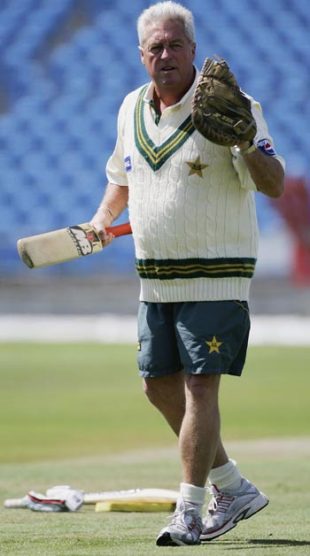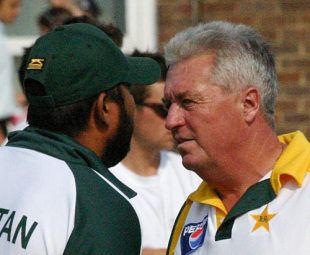Bob Woolmer
ESPNcricinfo staff

| |||
Woolmer, Robert Andrew, was found dead in his hotel room in Kingston, Jamaica, on March 18, 2007. He was 58. In life, Bob Woolmer had been a gifted player and an innovative, much-admired coach. In death, he became a global celebrity. The day before his body was found, his Pakistani charges had been beaten by Ireland and knocked out of the 2007 World Cup. Four days afterwards, the Jamaican police declared that he had been strangled, and perhaps poisoned as well. Inevitably, there was assumed to be a connection with the Ireland result, especially given Pakistan's past connection to match-fixing. The players themselves fell under suspicion, and the furore spread across the planet, to countries that knew nothing of cricket. A mass of often contradictory speculation focused on the possibility that Woolmer had intended to blow the whistle on cricketing corruption. It took more than two months before overseas pathologists contradicted their Jamaican colleague and forced the local police to withdraw the allegation. Even then, the case remained a mystery, and in November a Jamaican inquest jury returned an open verdict.
This extraordinary story inevitably overshadowed the World Cup and, to an extent, Woolmer's achievements. Even as a player, he was an individualist - confident in his opinions and fascinated by novelty - often to the detriment of his own career. He was one of the four English players to join both major insurrections of his era: Kerry Packer's World Series Cricket and the first South African rebel tour. Otherwise, he might easily have played many more than his 19 Tests.
Woolmer grew up in India, where his father Clarrie was an insurance executive and good club batsman, who played once for United Provinces. As a ten-year-old, Bob was taken by his dad to a game in Karachi, and he was there when Hanif Mohammad got out for 499. At school in Kent, he began to blossom and attracted the attention of the county coach, Colin Page. Kent signed him in 1968 and within two months he was making his debut: he made an unbeaten 50 against Essex.
Woolmer was not an instant sensation but his innate curiosity served him well - he often travelled in Colin Cowdrey's car, and lapped up advice - as did his adaptability: over the next few seasons, his bowling overtook his batting, and he was ideally suited to the new Sunday League. By 1972, England thought he was worth trying in one-day internationals, and on his debut at Old Trafford he successfully yorked both Chappells and had Doug Walters lbw. But he realised he needed to climb the strong Kent batting order if he was to make progress.
Kent gave him the chance (amid chuntering from colleagues) and, after some initial failures, he blossomed, finally making his maiden century in 1974. At Lord's the following year, when England were in disarray against Thomson and Lillee, they brought in Woolmer. He made less theatrical impact than the greying eccentric David Steele. But he made a respectable debut with bat and ball before being made twelfth man at Headingley, and then promoted to No. 5 at The Oval. Most observers thought this was ridiculous: he made five in the first innings, and England followed on 341 behind. Woolmer came in at 209 for three. It was the fifth morning, but this was a six-day Test: escape still seemed improbable. Tony Greig's instructions were clear: "Just stay there. I don't want you to do anything else, just block the shit out of them." And he did, for eight and a quarter hours; his century, in 394 minutes, was then the slowest ever made for England in an Ashes Test, but no one minded that, except the Australian fielders. Woolmer did a fair amount of nicking as well as blocking, which meant he learned a lot of Australian vernacular.
He also gained his opponents' respect: his 149 was then his highest first-class score, one short of his father's best of 150; but then that was made for Tonbridge. In 1976, Woolmer played in all five Tests against West Indies, but after 82 in the opening match, he was torpedoed and went down with the ship. In India in 1976-77, he struggled against the turning ball, and lost his place. By now he was opening regularly for Kent, and sometimes for England, as he did (without success) in the Melbourne Centenary Test. But he came back spectacularly in the 1977 Ashes summer, making 79, 120 and 137 in the first three innings, giving him three centuries in five Tests against Australia and causing John Woodcock, in The Times¸ to hope that here was England's No. 3 for the foreseeable future.

| |||
The cricketing future, however, was now less foreseeable than ever: the game was in turmoil over the Kerry Packer schism. Woolmer, initially opposed, began to soften his opposition as the summer wore on: on the eve of The Oval Test, Greig - now very much the ex-England captain - offered him £15,000 for three months' cricket a year. Woolmer's salary was £3,000 from Kent plus £200 a Test when selected. He still dithered, but claimed later the Lord's authorities had done little to discourage him. As a Packer player, he did little to enhance his reputation or earn his money, and his defection may have cost him the England captaincy.
But, with Woolmer, there was always the sense that he was motivated by curiosity and challenge as much as the money. By now his bowling had become negligible, and he was no longer a favoured son. England recalled him for the first two Tests against West Indies in 1980, but quickly dropped him again. And the same thing happened in 1981: he made a pair against Australia at Trent Bridge and after flopping again at Lord's was axed to make way for Mike Brearley's return as captain. He then found himself passed over as Kent vice-captain. Woolmer was already in South Africa when Graham Gooch's rebel team arrived early in 1982, and was delighted to join the party.
Woolmer had fallen in love with the country and formed firm views on the importance of building sporting bridges to end apartheid. And, when back trouble forced him to retire, it was there - with the Avendale club and Boland along with one unsuccessful season with Kent - that he turned all the cricketing ideas bubbling in his head into a coaching philosophy. This came to the fore when he joined Warwickshire for 1991, and became the prototype modern coach, always open to novel ideas. Perhaps his most important innovation was using the then new-fangled laptop as a coaching tool. Above all, he instilled in his players a sense of fearlessness, a willingness to subvert cricketing orthodoxy, epitomised by his love of the reverse sweep, which he turned from a novelty shot to an essential weapon. He took Warwickshire to three domestic trophies in 1994, helped by the presence of Brian Lara at the height of his run-hunger. Woolmer completed what must be a unique double when he saw Lara break Hanif's record. Then came his own golden era: five years with South Africa, and neither Hansie Cronje's downfall nor Woolmer's short-lived stunt of sending Cronje out with an earpiece to receive instructions can obscure the success of their partnership. He returned to Warwickshire, for three less happy years, then became the ICC's High Performance Manager. In 2004 he took on his last and perhaps biggest challenge: coaching Pakistan. When his men beat England only weeks after their 2005 Ashes triumph, he seemed still at the height of his powers: a perennially fractious team suddenly looked united. That did not last.
Twice England and Woolmer flirted with each other when the coach's job became vacant, but the timing was never right. Perhaps both sides subconsciously sensed it might not have worked: he was a natural communicator and loved chatting about cricket to all-comers, journalists perhaps more than anyone. His defensive technique would not have been tight enough to survive the British tabloids in vengeful mood. Indeed, his naive enthusiasm was always one of his most endearing characteristics. It may not have been coincidence that his teams tended to have secrets from him: drug use at Warwickshire, and match-fixing in South Africa, while the Pakistanis could hide whatever they wished by speaking Urdu. It would have been wholly out of keeping with Woolmer's known character for him to have stayed silent if aware of wrongdoing. That is one tribute to him. He loved cricket and enhanced it. And that is a tribute too.

